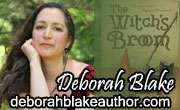Paganistan: Notes from the Secret Commonwealth
In Which One Midwest Man-in-Black Confers, Converses & Otherwise Hob-Nobs with his Fellow Hob-Men (& -Women) Concerning the Sundry Ways of the Famed but Ill-Starred Tribe of Witches.
A Lament for the Horned
'...In All the Greater Temples'
Long ago, the Horned God was worshiped “in all the greater temples”, to use Gardner's pungent phrase.
(Well, maybe not all, but why pass up a snazzy quote like that?)
Then came the Great Forgetting. When he wasn't forgotten, he was reviled. Oh, our lives were the worse for it.
A few of us remembered, though. Always we missed him. In the consoling darkness, we whispered to one another prophecies of his Return.
Well, guess what, folks: the prophecies were true.
In a traditional society, now, remembering, we would make a lament for all those Lost Years.
Get Out Your Sieve
In terms of structure and realized characters, Goat Foot God (1936) is Dion Fortune's best novel: better, really, than either Sea Priestess or Moon Magic.
Which, of course, is not to say that it's a good novel, mind you. (As a friend once put it, “Dion Fortune couldn't write her way out of a chalk circle.”) But—unlike her turgid and (frankly) unreadable non-fiction—it has at least characters and a story to embody her ideas. The casual (and gratuitous) racism and unquestioned class prejudice of one who presumably regarded herself as enlightened should stand as a warning to the reader to judge her ideas on intrinsic merit, not on authority. Caveat lector.
Still, it's her novel about the Horned God and his Return. That you've got to love and, indeed, on that topic she has much to impart. As for the bugs in the flour...well, sift carefully. The sieve is a traditional witch's tool for a reason.
The Great God Pan she describes, in Christian idiom, as “God made manifest in Nature.” The novel tells two stories simultaneously: one of an early 20th century Englishman with a serious Vitamin P deficiency (talk about a pungent phrase), and a 15th-century English monk who rediscovers Pan via some Greek manuscripts.
Well, we need our stories from the Lost Years, too: so we remember “...or, failing that, invent” (Monique Wittig).
A Lament for the Horned
As epigraph to the book, Fortune cites four stanzas from her Rite of Pan. Rereading them recently, I found myself thinking: Well, there's our Lament for the Horned.
The Goat-Foot God
Came the voice of Destiny,
calling o'er the Ionian Sea,
'The Great God Pan is dead, is dead,
humbled is the horned head;
shut the door that hath no key—
waste the vales of Arcady.'
Shackled by the Iron Age,
lost the woodland heritage,
heavy goes the heart of man,
parted from the light-foot Pan;
wearily he wears the chain
till the Goat-God come again.
Half a man and half a beast,
Pan is greatest, Pan is least.
Pan is all, and all is Pan;
look for him in every man.
Goat-foot swift and shaggy thigh—
follow him to Arcady.
He shall wake the living dead—
cloven hoof and horned head,
human heart and human brain,
Pan the goat-god comes again!
Half a beast and half a man—
Pan is all, and all is Pan.
Come, O Goat-God, come again!
For 'Pan', Read 'Horned God'
Fortune's poetry is mediocre at best, and this particular poem, though the cream of the lot, has its share of weaknesses. With its gratuitous archaic diction, jangling meter, garbled grammar, retroverted adjectives, and forced rhymes, it's essentially a Victorian poem in an Edwardian age, already out of date by its day of publication.
(Really, Dion: “Arcady” instead of “Arcadia” is bad enough, but tell me: does it rhyme with “key” or “thigh”?)
Still, though: it's a needed lament, and not, for all that, a bad one. It tells the needful tale, and (all things considered) tells it reasonably well.
Of course, it requires us to read, for “Pan”, “Horned God” instead. Usually that kind of mental gymnastic bothers me. Yes, he wears many names, but are not all names are place- and culture-bound? What has ancient Greece to do with “20th” century Britain?
In this case, though, I find myself somehow willing to humor, if not entirely excuse, the mixed metaphor. Why?
In her classic (1969) study of the god Pan in English literature, Pan the Goat-God: His Myth in Modern Times, Patricia Merivale chronicles how Pan had his modern literary heyday in the late 19th and early 20th centuries, but had virtually vanished from serious literature by the Second World War.
She's wrong, though. Pan didn't disappear from English literature after WWII.
He just grew antlers and naturalized.
A Song to Sing
At a Merrymeet years ago, I learned a hot little tune for the first four lines of the third stanza (beginning “Half a man and half a beast....”), recast as a chant by the presiding priest of the ritual, whose name, alas, I cannot remember. (Whoever you are/were, thank you!) With a bit of gentle tweeking, his tune can be expanded to fit the whole song.
Remind me to teach it to you, next time we see one another.
Welcome to Witch World
So, we have a lament, and we have a tune for it. It may not be the best, but it's the first. Some day, gods willing, we'll have more and better. Some day maybe I'll write one myself.
In the meantime, though, it's what we have, and having is its own virtue. Witches are pragmatists at heart and, after all, you have to start somewhere.
Welcome to Witch World, folks.
Better to sing the imperfect song, than not to sing the perfect one.
Comments
-
Please login first in order for you to submit comments




















